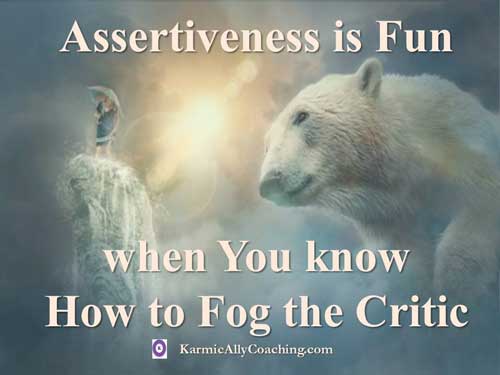
Have you ever had a critical boss, colleague or “friend” who has managed to put you down in such a manner that no one noticed it apart from you?
Think hard, has there ever been a time when you have been receiving so-called constructive criticism or well-wisher advice that has left you knotted in the stomach?
Or confused you when you replayed the conversation wondering whether your response was adequate and appropriate to the situation?
Do You recognize Passive-Aggressive Communication when it’s staring you in the face?

Quite possibly you have been subjected to Passive-Aggressive communication with mixed messages that can easily trip even the most assertive individual.
This style of indirect communication is quite destructive. It’s often not easy to identify as the body language may not match the tone or choice of words.
Sometimes the comment may be funny or full of sarcasm. Warning bells should sound if you are receiving mixed messages which are leaving you confused or making you resentful.
You might be dealing with a toxic colleague.
Then it is time to take action before your self-confidence takes a hit.
One example that I remember from my teen years happened to a friend which illustrates the point.
“I love your almond shaped eyes; they take attention away from the acne on your cheeks”.
On hearing that statement she was completely stunned – was it a compliment or a jibe?
Hours of girl-talk later, we were not sure but felt it was criticism and knew she should have responded. If only we had known, about the assertiveness skill of fogging to diffuse criticism and prevent conflict.
How to master the assertiveness skill of fogging

Fogging is based on agreeing with your critic like a fog bank. Here, we look at the criticism as feedback accepting that it is only that person’s opinion. Your own opinion about yourself is the one that matters.
But what if there is some truth in what the other person is saying, however sloppily it is communicated?
Instead of launching into a defensive attack or arguing, would it not be more productive to try to get to the root of what is being communicated?
With fogging you acknowledge what the critic is saying or some part of it which may be true.
You may not agree with what is being said as relating to you, but you agree with the possibility that what they say is true.
In other words, you absorb the criticism without getting defensive. You stay calm, leading to further dialogue as the other person feels they have been heard.
You can also ask the critic to clarify their assertion thus putting the burden on the critic to explain themselves.
Don’t be surprised if the critic backs off.
It is quite exhausting to continue criticizing someone who is not reacting in the manner the critic would like.
In my friend’s case the options would have been:
- If she felt, there was some truth in the statement. You’re right, my eyes do take attention away from the acne on my cheeks
- If she didn’t agree with the criticism but was willing to admit to the possibility of the critic being right. Sometimes my eyes and other features do deflect attention away from the acne on my cheeks
- If she didn’t agree with the criticism, she could simply admit to the principle of the criticism. Sometimes it helps to have other features to cover for the flaws on a person’s face
Past the absorption stage the next step would have been to ask for clarifications. Like, what should one do about the acne?
My friend might have learned something useful about acne treatment or better yet, the critic might have backed off!
In such a situation, which option would you use?
PS. Carrying off this assertive technique requires self-assurance and confidence. If you feel you need help in that area, please do check out my Kindle book – Self Confidence in 8 Steps.
Know someone who is suffering from criticism and needs a strategy to tackle the aggressor? Please share this post with them using the share buttons below. Thanks!
Written By: Vatsala Shukla




 I adhere to the Certified Coaches Alliance Code of Ethics and Standards. A copy is available on request.
I adhere to the Certified Coaches Alliance Code of Ethics and Standards. A copy is available on request.
 Let's Talk through the Connect Form:
Let's Talk through the Connect Form: